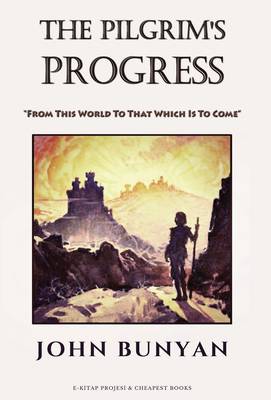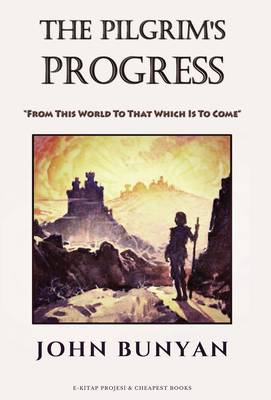
- Retrait gratuit dans votre magasin Club
- 7.000.000 titres dans notre catalogue
- Payer en toute sécurité
- Toujours un magasin près de chez vous
- Retrait gratuit dans votre magasin Club
- 7.000.0000 titres dans notre catalogue
- Payer en toute sécurité
- Toujours un magasin près de chez vous
Description
The Pilgrim's Progress, religious allegory by the English writer John Bunyan, published in two parts in 1678 and 1684. The work is a symbolic vision of the good man's pilgrimage through life. At one time second only to the Bible in popularity, The Pilgrim's Progress is the most famous Christian allegory still in print. It was first published in the reign of Charles II and was largely written while its Puritan author was imprisoned for offenses against the Conventicle Act of 1593 (which prohibited the conducting of religious services outside the bailiwick of the Church of England).
Part I
Part I (1678) is presented as the author's dream of the trials and adventures of Christian (an everyman figure) as he travels from his home, the City of Destruction, to the Celestial City. Christian seeks to rid himself of a terrible burden, the weight of his sins, that he feels after reading a book (ostensibly the Bible). Evangelist points him toward a wicket-gate, and he heads off, leaving his family behind. He falls into the Slough of Despond, dragged down by his burden, but is saved by a man named Help. Christian next meets Mr. Worldly Wiseman, who persuades him to disregard Evangelist's advice and instead go to the village of Morality and seek out Mr. Legality or his son Civility. However, Christian's burden becomes heavier, and he stops. Evangelist reappears and sets him back on the path to the wicket-gate. The gatekeeper, Good-will, lets him through and directs him to the house of the Interpreter, where he receives instruction on Christian grace.
Part II
In Part II (1684) Christian's wife, Christiana, and their sons as well as their neighbour Mercy attempt to join him in the Celestial City. The psychological intensity is relaxed in this section, and the capacity for humour and realistic observation becomes more evident. Christian's family and Mercy--aided (physically and spiritually) by their guide Great-heart, who slays assorted giants and monsters along the way--have a somewhat easier time, because Christian has smoothed the way, and even such companions as Mrs. Much-afraid and Mr. Ready-to-halt manage to complete the journey. Whereas most of the people encountered by Christian exemplify wrong thinking that will lead to damnation, Christiana meets people who, with help, become worthy of salvation. When they reach the Celestial City, Christiana's sons and the wives they married along the way stay behind in order to help future pilgrims.
Spécifications
Parties prenantes
- Auteur(s) :
- Editeur:
Contenu
- Nombre de pages :
- 228
- Langue:
- Anglais
Caractéristiques
- EAN:
- 9786057748447
- Format:
- Livre relié
- Format numérique:
- Genaaid
- Dimensions :
- 140 mm x 216 mm
- Poids :
- 426 g

Les avis
Nous publions uniquement les avis qui respectent les conditions requises. Consultez nos conditions pour les avis.






